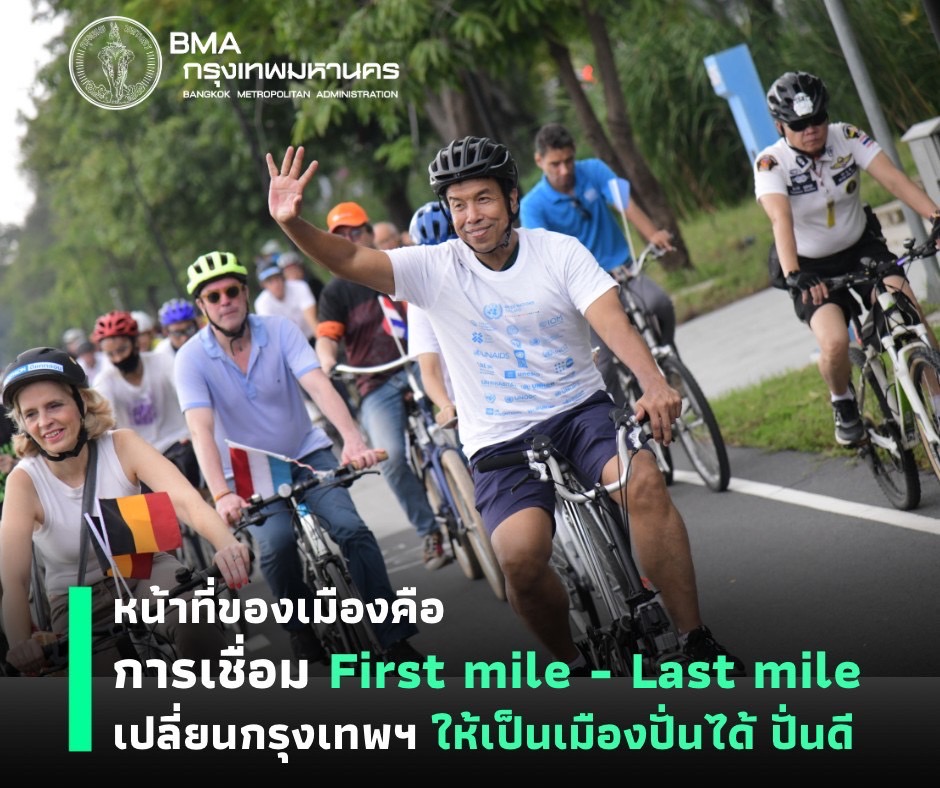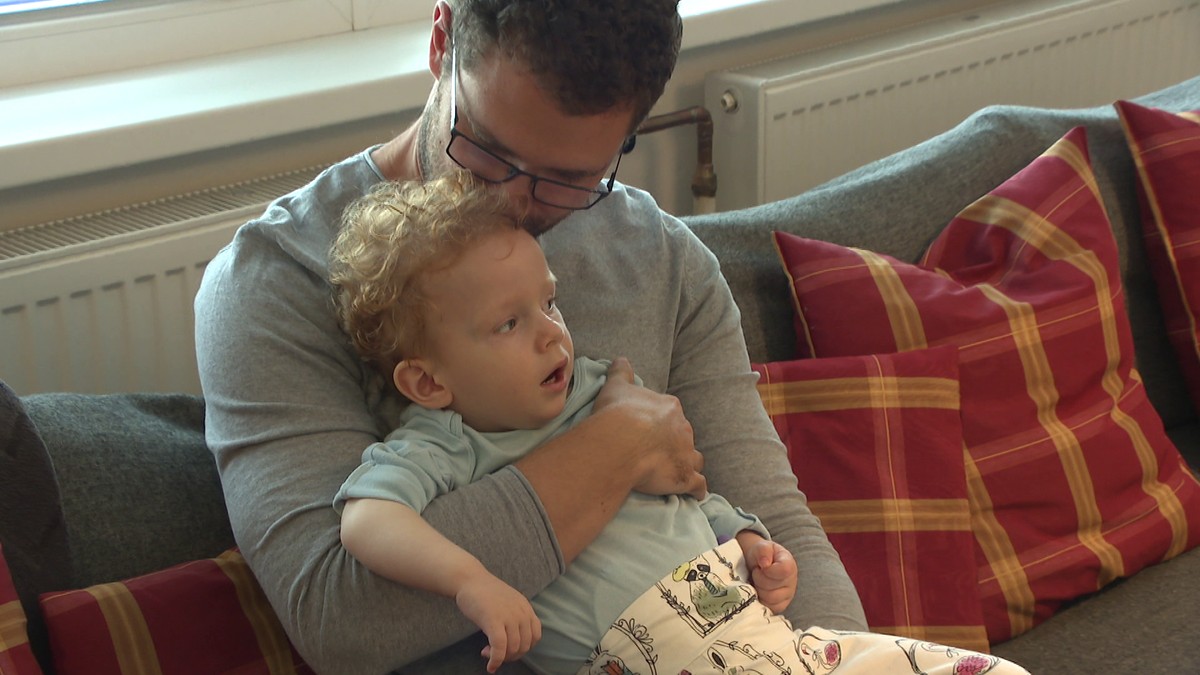Mr. Chatchat Sitthiphan, Governor of Bangkok Leading the Bangkok management team Thai Walking and Cycling Institute Foundation Disaster Communication Development Center by Thai PBS and network partners Participate in the Bangkok Car Free 2023 seminar activity “Obstacles, Opportunities, Future” at the Benjakitti Park Museum building that will let us know about policies and guidelines for development and promotion to get people to use mass transit more, such as improving roads, sidewalks, installing Set up lighting Feeder system development Developing a route from home (Capillaries) – the main mass transit system and from the main mass transit system – work First mile – Last mile to transform Bangkok into a cycling city, cycling well, being one of the bicycle capitals of the world.
“The matter of Car Free Day, which we want to be Car Free Everyday, is important. I don’t want this event to be just about creating images. But I really want it to be a matter of strategic planning for Car Free Everyday. What are the problems and obstacles that make Bangkokians choose to use cars or not? Not from the main route But the problem is getting from home to the main route. or from the main route to work is considered the last mile that is directly responsible for the city. Because the city has to take care of the capillaries. As for the main routes, the Ministry of Transport, Railways or BMTA will already take care of them.”
“The Walkable Bangkok policy that we have been working on for over a year has been making sidewalks for people to walk on. Having electricity to keep people safe This is all part of Car Free Day. Another important thing is that the price must be appropriate. Bangkok may have to help with making the Feeder. Point to Point connectivity is a strategy that administrators must implement,” said Governor Chatchat.
• Bicycle Corridor policy towards the “future” of Bangkok
Mr. Sanont Wangsangbun, Deputy Governor of Bangkok Participated in talking about the capillary policy for improving walkways and bicycle paths to make First Mile-Last Mile happen.
“This Car Free 2023 activity will not have the word Day because our intention is to have results for more than just one day. Today’s event was made possible by many elements involved, including volunteers coming from many districts to join in surveying the area. A team of BMA District Offices and Bangkok Civil Servants who worked hard to improve the area and resolve complaints. The theme for the first day was Obstacles. The next day was an opportunity. And today’s theme is the future. which have all been collected Bicycle policy in care One of the policies in 216 is to create a Bicycle Corridor, creating a large bicycle route. Many cities have bicycle routes in every direction. It’s a spider trail throughout the city. But in Bangkok, the main route may be Khlong Saen Saep. Currently, the Drainage Department has prepared a budget to improve this entire route and expects that it will be completed in 2024 to become the main route in the east. For the northern route along the expressway, the obstacle is the road crossing. There will be improvements and additional budget allocated. Bicycle Corridor is another interesting route that is in the improvement plan. is the Khlong Phadung Krung Kasem route There are 8 bridges and budget will be allocated to build underpasses to connect the routes to each other continuously.”
Deputy Governor Sanon added that Once we have the Bicycle Corridor complete, the Bicycle District will be the final phase of our work. The results of the survey which came from the work of volunteers today, including 243 routes, a distance of 642.43 kilometers, with a total of 887 obstacles, is considered an important collaboration. And it’s the hope to make Car Free not just today. But it will improve the entire city. To make the Last Mile policy really happen
In 2023, Bangkok has already fixed 129 kilometers of sidewalk problems. Another 87 kilometers are in the process of being fixed. In 2024, the goal is to amend another 157 kilometers in 35 routes, which will include adding reinforced concrete to sidewalks. Changing the lighting to LED, providing BRT services Expansion of routes and increase of frequency, provision of Feeder service from the original 4 routes, adding 1 additional route, improvement of passenger accommodation pavilion, construction of a cover walkway, walkway along the canal and making a sky walkway
• 6 district groups join hands with volunteers to explore problems and obstacles along the First Mile/Last Mile route at the capillary level.
Representatives of the 6 district groups presented the results of the route survey, problems, obstacles, solutions, and goals for improving the First Mile/Last Mile routes to connect to convenient and safe travel by joining with volunteers on bicycles to explore the area at the capillary level as follows:
1. North Bangkok area group, total distance 38.57 Bangkok, total obstacles 46 points, problems found on main roads such as Theparak Road, Songprapa Road, obstacles are sidewalks with damaged ramps, intersections, light signals, flooding, which part of the route It is a connecting link to the Green and Red Line electric train systems. and connecting routes between communities to the train station and pier. The district office immediately fixed the problems found. But for problems that cannot be resolved, budget allocation will be requested for further correction. Volunteers who surveyed the route suggested that the district fix safety issues as a matter of urgency. To build confidence in those who will turn to bicycles as an alternative.
2. Southern Bangkok District, total distance 65.59 kilometers, total obstacles 141 points, problems found are: The sidewalks are uneven and rough, and there are no bicycle ramps. As for the road surface, there are problems with grooves in the drain grate cover that are dangerous for cyclists. May cause a falling accident. If it can be adjusted to a smooth road, it will make people who ride bicycles safer. Volunteers also proposed creating bicycle lanes in several areas, with the district considering appropriate action.
3. Central Bangkok District, total distance 83.16 kilometers, total obstacles 101 points, problems found are: pedestrian obstruction Lack of bicycle parking Sewerage manholes, narrow sidewalks, lack of sidewalks, zebra crossings, ramps. The advantage in the area is that there is a transportation system on wheels, rails, and boats, which will connect the outer areas to the inner Bangkok area. In the past, the district has resolved some of the problems. The volunteer’s suggestion was to improve the bicycle path. Installation of electric lighting for bicycle paths Continuously adding ramps
4. Eastern Bangkok District Group, distance 56.64, total obstacles 105 points. Problems found include traffic signals, narrow sidewalks, electric train construction areas, drainage tracks, level crossings. The district group has already taken some steps to fix it. But there are still some parts that must wait for budget allocation. which every district will expedite the process immediately In addition, volunteers have suggested that Bangkok conduct a public relations campaign to encourage motorists to reduce their speed. To make the traveling public more safe.
5. Nuea Krung Thon District, distance 47.64 kilometers, total obstacles 127 points, because the area conditions are very different, including green areas and old communities, so there are many tourist groups. The problem encountered is that the traffic lines are not clear. There are no signs indicating shortcuts. The edge of the sidewalk and the road surface have very different heights. In addition, volunteers have suggested that Bangkok cancel the use of V-shaped drainage pipes for the safety of cyclists.
6. Southern Krungthon District Group, distance 30.77 kilometers, total obstacles 100 points, mostly in community and residential areas. The problem found is Safety of sidewalks and roads. If utilities are removed from sidewalks, it may make traveling more convenient. Problem of lack of clear and clear traffic lines All connections to the Feeder This will increase travel opportunities for the people.
Then there was a discussion on the topic: Why does Bangkok have to be Car Free?…How many more years will it take to get it? By the Thai Walking and Cycling Institute Foundation Participate in a discussion on the issue and a discussion on the topic Bangkok: Breathable city to Livable city, Bangkok to become a livable city where people can breathe, by Greenpeace and ThaiPBS
2023-09-24 16:06:00
#citys #duty #connect #mile #mile #changing #Bangkok #cycling #city #cycle


